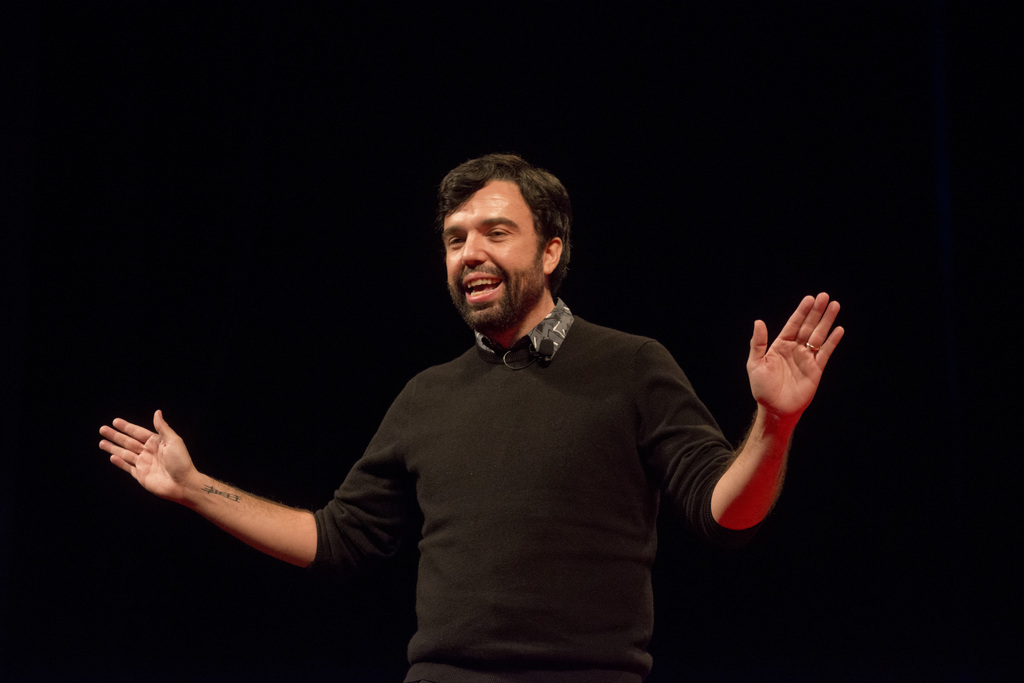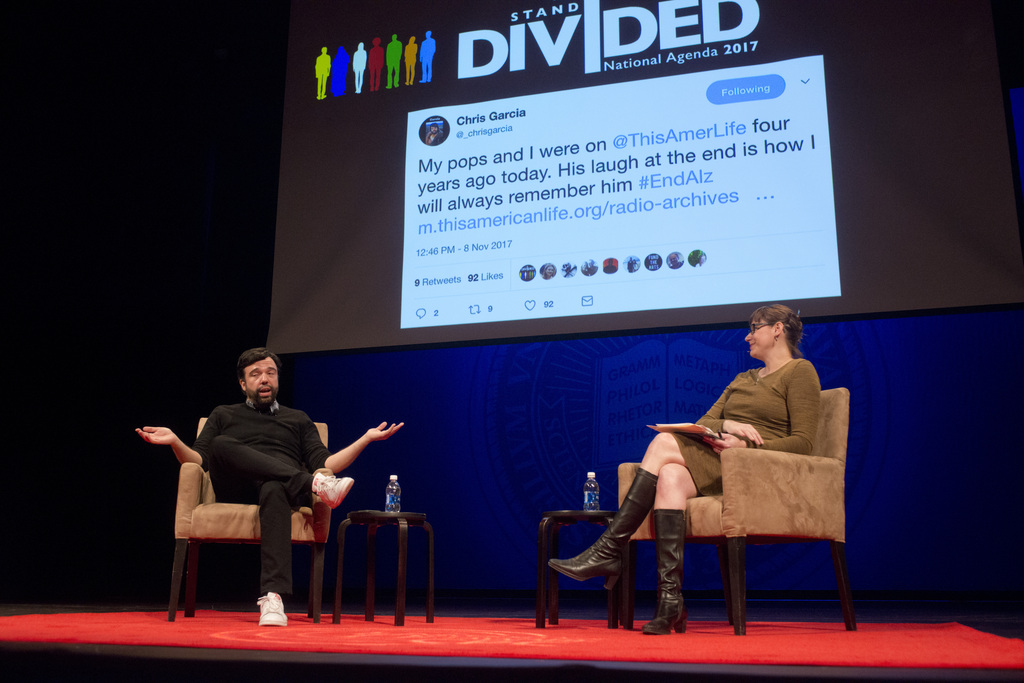Chris Garcia, Cultural Divides
Humanizing the immigrant experience
Watch the video. Listen to and download the podcast. Read and download the transcript.
NOVEMBER 20, 2017 – The University of Delaware’s National Agenda 2017 speaker series concluded on November 15 with a conversation about cultural divides with Los Angeles-based comedian and writer Chris Garcia. The firstborn son of Cuban refugees said that his cultural heritage and his respect for his family shape his identity and connect him to his community.
Garcia cut his comedy teeth in the San Francisco Bay Area, where he became a local favorite. Now based in Los Angeles, and he has appeared on numerous shows and podcasts including Comedy Central’s At Midnight, NBC’s Last Call with Carson Daily, NPR’s This American Life, the WTF with Marc Maron podcast, 2 Dope Queens podcast. Garcia was a new face at the 2016 Montreal Just for Laughs Comedy Festival where he was named “Best of the Fest.” As a writer Garcia has worked as the editor for RooftopComedy.com, he’s written for the 2015 CBS Diversity Sketch Showcase, he’s contributed to numerous shows including the Comedy Central Roast of Justin Bieber and the MTV Movie Awards. Garcia has also written and recorded music and he recently completed the National Hispanic Media Coalition’s television writers program for the second time, as intensive scriptwriters? workshop that prepares Latino writers for success in network television.

Garcia’s segment about his father’s Alzheimer’s disease on This American Life in November 2013 gained worldwide popularity. In an interview on the show, Garcia walked through a conversation he recorded in the car with his father after realizing that his father had forgotten who he was for the first time. When they drove by a baseball field, his father asked if he played, said Garcia. “And I was like, yeah I played baseball. When you”re a Cuban kid and your dad’s Cuban, that’s like what you got.”
Garcia shared his family’s story of surviving Fidel Castro’s Communist regime. “My father was studying to become a physicist, and he was not a communist, and because of that he was taken out of the university and he was put in a camp where he was put in solitary confinement and he pulled sugarcane with his bare hands for two years. He was beaten, he was spit at, he was tortured, he was given electroshock therapy. People would yell, the guards there would tell him there’s no Papa Dios, there’s no God. There’s only Papa Che and Papa Fidel. He survived on dirty water and moldy food for two years.”
Garcia’s father fled to Spain and worked several jobs over the next two years, earning enough money to move Garcia’s mother and sister to Spain. The young family later moved to Los Angeles, where Garcia was born. Garcia struggled as a child with learning disabilities and described how his parents tried to help him. His father worked blue collar jobs and graveyard shifts to pay for private school and tutoring. Garcia went on to become a good student and eventually graduated from the University of California Berkeley.

Responding to a November 2017 CPC public opinion poll measuring public support for President Trump’s proposal to build a wall along the border between Mexico and the U.S., Garcia thinks that the wall would serve less as a physical deterrent and more as a symbol of hatred, expressing a message to “Stay out, Mexico.”
“It’s really unfortunate in this country and some people just scapegoat the new guy,” said Garcia. “You live in the middle of the country, your job doesn’t exist anymore, you’re frustrated, you’re poor, you’re broke and you”re like well let’s take it out on the Mexicans … We”re all trying to support our families. My dad worked in an industry where his job became obsolete … A coal miner and my dad have more in common than sometimes a coal miner and his own neighbor.”
In his career, Garcia wants to develop entertainment and content that humanizes Latinos. “So far the narrative has just been we”re just the help. You know? We”re just here to help you. We”re a nuisance. We”re illegal, a term you shouldn’t use to describe a person. It’s a term that should describe an action.”
Ultimately, Garcia wants to connect with people who feel disenfranchised. “I don’t have a huge political agenda. I would like to impart something to people like me that grew up the fringes, marginalized parts of society. I would love to leave a legacy where they feel a sense of belonging. I think that would be a great gift to be able to give people.”
The seventh annual National Agenda speaker series, hosted by UD’s Center for Political Communication, brings nationally known speakers to campus. This year’s theme, “As We Stand | Divided,” explored religious, political, cultural and other divides in the United States. National Agenda is free and open to the public and made possible with support from the University of Delaware Office of the Provost. For more information, please visit www.cpc.udel.edu/nationalagenda.
